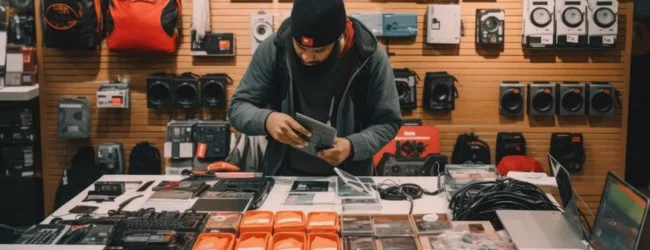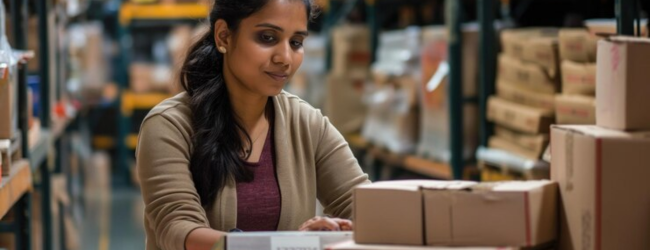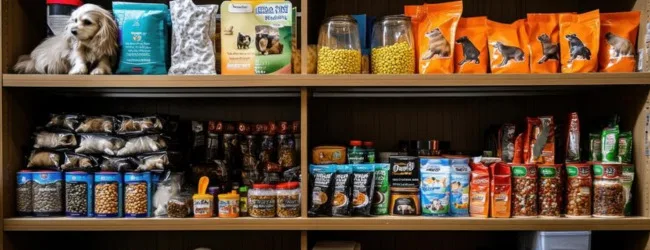Table of contents
- What is a Wholesale Business?
- Types of Wholesale Businesses
- Benefits of Wholesale Businesses
- 10 Best Wholesale Business Ideas
- 1. Wholesale of Organic and Sustainable Products
- 2. Wholesale of Electronic Accessories
- 3. Wholesale of Industrial Safety Equipment
- 4. Wholesale of Packaging Materials
- 5. Wholesale of Medical Supplies
- 6. Wholesale of Home and Kitchen Appliances
- 7. Wholesale of Building Materials
- 8. Wholesale of Textiles and Garments
- 9. Wholesale of Agricultural Produce
- 10. Wholesale of Pet Supplies
- Conclusion
- Frequently Asked Questions (FAQs)
The Indian wholesale market is a powerhouse, offering immense potential for entrepreneurs. As we approach 2025, identifying the right best wholesale business opportunities is crucial for success. This article delves into 10 promising wholesale business ideas, providing a roadmap for your profitable venture.
What is a Wholesale Business?
At its core, a wholesale business operates as a vital intermediary within the supply chain. It involves purchasing goods in bulk directly from manufacturers, producers, or suppliers, and then reselling these products in smaller quantities to retailers, other businesses, or institutions. This business model focuses on business-to-business (B2B) transactions, facilitating efficient distribution and inventory management. Wholesalers bridge the gap between production and retail, enabling manufacturers to concentrate on production while retailers access a wide range of products from various sources.
Types of Wholesale Businesses
Wholesale businesses can be broadly categorized based on their functions, product specialization, and target customers:
Merchant Wholesalers:
- These are the most common type of wholesalers. They take ownership of the goods they purchase and resell.
- They operate independently and bear the risks associated with inventory management and market fluctuations.
- Merchant wholesalers can be further classified into:
Full-Service Wholesalers: They provide a comprehensive range of services, including warehousing, delivery, marketing support, and credit facilities.
Limited-Service Wholesalers: They offer fewer services, focusing primarily on product distribution. Examples include:
- Cash-and-Carry Wholesalers: They sell goods on a cash-only basis, and customers are responsible for transporting their purchases.
- Truck Wholesalers (Jobbers): They specialize in delivering perishable goods, such as fruits and vegetables, directly to retailers.
- Drop Shippers: They take orders from retailers but do not handle the physical goods. Instead, they forward the orders to manufacturers, who ship the products directly to customers.
- Rack Jobbers: They manage and stock retail store shelves with specific products, such as magazines or snacks.
Brokers and Agents:
- Unlike merchant wholesalers, brokers and agents do not take ownership of the goods.
- They act as intermediaries, connecting buyers and sellers and facilitating transactions.
- They earn commissions on the sales they generate.
Brokers: They specialize in bringing buyers and sellers together for specific transactions, such as real estate or commodities.
Agents: They represent manufacturers or suppliers and negotiate sales on their behalf.
Manufacturers’ Sales Branches and Offices:
- These are wholesale operations owned and operated by manufacturers.
- They allow manufacturers to bypass independent wholesalers and sell directly to retailers or industrial users.
- They provide greater control over distribution and customer relationships.
- This structure is most often used by very large manufacturing companies.
Specialty Wholesalers:
- These wholesalers specialize in a very specific niche of products. For example, a wholesale business could specialize in only organic spices, or only high end imported tiles.
- This allows the company to become a leading expert in the goods they sell.
Benefits of Wholesale Businesses
Wholesale businesses offer several advantages to both suppliers and retailers
1 . Bulk Purchasing and Cost Savings:
- Wholesalers purchase goods in large quantities, enabling them to negotiate lower prices from suppliers.
- They pass on these cost savings to retailers, allowing them to offer competitive prices to consumers.
2 . Efficient Distribution:
- Wholesalers handle the complexities of logistics, warehousing, and transportation, streamlining the distribution process.
- They ensure that products reach retailers in a timely and efficient manner.
3 . Inventory Management:
- Wholesalers maintain large inventories, reducing the burden on retailers to store excess stock.
- This allows retailers to focus on sales and customer service.
4 . Market Expertise and Product Knowledge:
- Wholesalers often possess in-depth knowledge of their product categories and market trends.
- They can provide valuable insights and support to retailers, helping them make informed purchasing decisions.
5 . Credit Facilities:
- Many wholesalers offer credit facilities to retailers, allowing them to purchase goods on credit and manage their cash flow effectively.
6 . Risk Mitigation:
- By managing much of the distribution and storage, wholesalers take on a large portion of the risk involved in selling goods, which lowers that risk for both the producer, and the retailer.
7 . Access to a Wide Range of Products:
- Wholesalers collect a large range of products from many different producers, thus retailers can use one wholesaler to fill many of their needs.
8 . Economies of Scale:
- Wholesalers benefit from economies of scale, as they handle large volumes of goods. This allows them to operate more efficiently and reduce overall costs.
10 Best Wholesale Business Ideas
1. Wholesale of Organic and Sustainable Products

Supplying a wide array of organic and sustainable products, including food items (grains, spices, oils), packaging materials (biodegradable bags, compostable containers), and lifestyle products (eco-friendly cleaning supplies, sustainable textiles).
a. Why this Idea:
- Rising consumer awareness of health and environmental impacts.
- Increasing demand for chemical-free and ethically sourced products.
- Government initiatives promoting sustainable agriculture and eco-friendly practices.
b. Licenses Required:
- FSSAI (Food Safety and Standards Authority of India) license for food products.
- GST (Goods and Services Tax) registration.
- Trade license from local municipal authorities.
- Organic certification (e.g., India Organic, PGS-India) for certified organic products.
c. Investment Required:
- Medium to high, depending on the product range and storage facilities.
- Initial investment in sourcing, packaging, and logistics.
d. How to Sell:
- Online B2B marketplaces (e.g., IndiaMART, Tradeindia).
- Direct sales to organic food stores, supermarkets, and restaurants.
- Partnerships with eco-conscious retailers and distributors.
- Participation in organic trade shows and exhibitions.
e. Any other Requirements:
- Reliable network of certified organic farmers and suppliers.
- Adequate storage facilities with temperature control for perishable goods.
- Efficient logistics and transportation for timely delivery.
- Quality control processes.
f. Challenges in the Idea:
- Maintaining consistent product quality and supply.
- Competing with conventional products and established brands.
- Managing perishable goods and ensuring proper storage.
- Higher cost of organic goods.
g. How to overcome the Challenges:
- Establish strong relationships with certified suppliers and farmers.
- Implement rigorous quality control measures and product testing.
- Invest in cold storage and efficient logistics.
- Educate customers on the value of organic goods.
H. Example: A company specializes in supplying organic, cold-pressed oils and organic flours, with a focus on traceable sourcing and sustainable packaging. They offer bulk discounts to health food stores and restaurants, with a USP of providing detailed product information and certifications.
ALSO READ | 10 Highly Profitable Manufacturing Business Ideas Under ₹50,000
2. Wholesale of Electronic Accessories

Distributing a wide range of electronic accessories, including phone cases, chargers, headphones, computer peripherals, and smart home gadgets.
a. Why this Idea:
- Rapid growth of the smartphone and consumer electronics market.
- Increasing demand for accessories to enhance device functionality and style.
- Constant innovation and introduction of new gadgets.
b. Licenses Required:
- GST registration.
- Import license (if importing accessories from overseas).
c. Investment Required:
- Medium, depending on the inventory and product range.
- Investment in sourcing, storage, and logistics.
d. How to Sell:
- Online B2B platforms and e-commerce websites.
- Direct sales to mobile phone stores, electronics retailers, and repair shops.
- Partnerships with online marketplaces and distributors.
e. Any other Requirements:
- Strong relationships with reliable suppliers and manufacturers.
- Efficient inventory management and logistics.
- Knowledge of current trends.
f. Challenges in the Idea:
- Rapid technological changes and product obsolescence.
- Competition from numerous suppliers and brands.
- Managing inventory of diverse products and ensuring quality.
g. How to overcome the Challenges:
- Stay updated with market trends and product launches.
- Focus on quality and offer competitive pricing.
- Implement efficient inventory management and logistics systems.
- Build strong relationships with suppliers.
H. Example: A wholesaler focuses on providing high-quality, branded phone accessories, offering bulk discounts to mobile repair shops and retail stores. They provide a warranty on their products and ensure fast delivery, with a USP of offering personalized accessory bundles.
3. Wholesale of Industrial Safety Equipment

Supplying a wide range of industrial safety equipment, including helmets, gloves, safety shoes, protective clothing, and first-aid kits.
a. Why this Idea:
- Increasing awareness of workplace safety and regulatory compliance.
- Growing industrial and construction sectors.
- Government emphasis on worker safety and health.
b. Licenses Required:
- GST registration.
- Industry-specific certifications (e.g., ISI, CE) for safety equipment.
c. Investment Required:
- Medium, depending on the product range and inventory.
- Investment in sourcing, quality testing, and logistics.
d. How to Sell:
- Direct sales to factories, construction sites, and industrial suppliers.
- Partnerships with industrial distributors and safety equipment retailers.
- Participation in industrial trade shows and exhibitions.
e. Any other Requirements:
- Strong relationships with certified manufacturers and suppliers.
- Quality certifications and compliance with safety standards.
- Efficient logistics and delivery.
- Product knowledge.
f. Challenges in the Idea:
- Meeting stringent quality and safety standards.
- Competition from established players and brands.
- Managing inventory and ensuring timely delivery.
g. How to overcome the Challenges:
- Focus on quality and certifications.
- Build strong relationships with industrial clients.
- Offer competitive pricing and timely delivery.
- Provide after sales support.
H. Example: A wholesaler specializing in providing customized safety solutions to construction companies, offering on-site assessments and training. They provide a wide range of certified safety equipment and ensure timely delivery, with a USP of providing a complete safety solution package.
💡 Pro Tip: If you want to start a Business but have too many doubts, connect with a Business expert from Boss Wallah for guidance – https://bw1.in/1116
4. Wholesale of Packaging Materials

Supplying a wide range of packaging materials, including cardboard boxes, plastic containers, bubble wrap, and packing tape.
a. Why this Idea:
- Rapid growth of the e-commerce and retail sectors.
- Increasing demand for packaging materials for product protection and shipping.
- Growing awareness of sustainable packaging solutions.
b. Licenses Required:
- GST registration.
c. Investment Required:
- Medium, depending on the product range and inventory.
- Investment in sourcing, storage, and logistics.
d. How to Sell:
- Direct sales to e-commerce companies, retail stores, and manufacturing units.
- Online B2B platforms and e-commerce websites.
- Partnerships with packaging distributors and retailers.
e. Any other Requirements:
- Efficient storage facilities and inventory management.
- Reliable logistics and delivery network.
- Ability to customize.
f. Challenges in the Idea:
- Managing inventory and ensuring timely delivery.
- Competition from established suppliers and brands.
- Adapting to changing packaging trends and regulations.
g. How to overcome the Challenges:
- Offer customized packaging solutions and competitive pricing.
- Implement efficient inventory management and logistics systems.
- Stay updated with packaging trends and regulations.
- Focus on customer service.
H. Example: A wholesaler specializes in providing eco-friendly packaging solutions, including biodegradable and compostable materials. They offer customized printing and sizing options, with a USP of providing sustainable and visually appealing packaging.
5. Wholesale of Medical Supplies

Distributing a wide range of medical supplies, including surgical instruments, diagnostic equipment, hospital furniture, and disposable medical items.
a. Why this Idea:
- Growing healthcare sector and increasing demand for medical supplies.
- Expansion of hospitals and clinics in urban and rural areas.
- Increasing awareness of preventive healthcare and diagnostics.
b. Licenses Required:
- Drug license (for pharmaceuticals and certain medical devices).
- GST registration.
- Import license (if importing medical supplies from overseas).
- Certifications from regulatory bodies like CDSCO (Central Drugs Standard Control Organization)
c. Investment Required:
- High, due to specialized product range and quality requirements.
- Investment in storage facilities, quality control, and logistics.
d. How to Sell:
- Direct sales to hospitals, clinics, and pharmacies.
- Participation in medical trade shows and exhibitions.
- Online B2B platforms specializing in medical supplies.
- Bidding on Government tenders.
e. Any other Requirements:
- Quality certifications and compliance with regulatory standards.
- Cold storage for temperature-sensitive products.
- Efficient logistics and delivery network.
- Deep product knowledge.
f. Challenges in the Idea:
- Strict regulatory requirements and quality control.
- Managing sensitive products and ensuring proper storage.
- Competition from established medical supply companies.
g. How to overcome the Challenges:
- Ensure compliance with all regulatory requirements and quality standards.
- Invest in proper storage facilities and logistics.
- Build strong relationships with healthcare providers.
- Provide excellent after sales support.
H. Example: A wholesale business specializing in providing high-tech diagnostic equipment, offering installation, training, and maintenance services. They partner with hospitals and clinics, ensuring timely delivery and quality assurance, with a USP of providing a complete diagnostic solution package.
6. Wholesale of Home and Kitchen Appliances

Supplying a wide range of home and kitchen appliances, including refrigerators, washing machines, microwaves, and small kitchen gadgets.
a. Why this Idea:
- Growing demand for home appliances in urban and rural areas.
- Increasing disposable incomes and changing lifestyles.
- Rising popularity of smart home appliances.
b. Licenses Required:
- GST registration.
- Import license (if importing appliances from overseas).
c. Investment Required:
- Medium to high, depending on the product range and inventory.
- Investment in storage facilities, logistics, and marketing.
d. How to Sell:
- Direct sales to retail stores and appliance showrooms.
- Partnerships with e-commerce platforms and online retailers.
- Participation in home appliance trade shows.
e. Any other Requirements:
- Efficient storage facilities and inventory management.
- Reliable logistics and delivery network.
- Strong relationship with appliance manufacturers.
f. Challenges in the Idea:
- Competition from established brands and distributors.
- Managing inventory and ensuring timely delivery.
- Keeping up with technological advancements and product innovations.
g. How to overcome the Challenges:
- Focus on niche products or offer competitive pricing.
- Implement efficient inventory management and logistics systems.
- Build strong relationships with retailers and e-commerce partners.
- Provide excellent after sales support.
H. Example: A wholesale business specializing in energy-efficient kitchen appliances, offering bulk discounts and installation services. They focus on providing smart home integrated devices, with a USP of providing cutting edge technology and energy saving products.
7. Wholesale of Building Materials

Distributing a wide range of building materials, including cement, steel, tiles, plumbing supplies, and electrical fittings.
a. Why this Idea:
- Growing infrastructure and real estate sectors.
- Increasing demand for construction materials in urban and rural areas.
- Government initiatives promoting affordable housing and infrastructure development.
b. Licenses Required:
- GST registration.
- Industry-specific certifications (e.g., ISI) for building materials.
c. Investment Required:
- High, due to large inventory and logistics requirements.
- Investment in storage facilities, heavy-duty logistics, and transportation.
d. How to Sell:
- Direct sales to construction companies, builders, and contractors.
- Partnerships with hardware stores and building material retailers.
- Participation in construction trade shows and exhibitions.
e. Any other Requirements:
- Large storage facilities and inventory management.
- Heavy-duty logistics and transportation network.
- Strong relationships with manufacturers.
f. Challenges in the Idea:
- Managing large inventory and ensuring timely delivery.
- Fluctuating prices and market volatility.
- Competition from established players and brands.
g. How to overcome the Challenges:
- Build strong relationships with suppliers and manufacturers.
- Implement efficient inventory management and logistics systems.
- Offer competitive pricing and timely delivery.
- Provide good customer service.
H. Example: A wholesale business specializing in sustainable building materials, offering customized solutions and on-site delivery. They focus on providing eco-friendly alternatives and energy efficient solutions, with a USP of providing sustainable building material packages.
ALSO READ | Start an Online Marketing Home based Business : Step-by-Step Guide for 2025
8. Wholesale of Textiles and Garments

Supplying a wide range of textiles and garments, including fabrics, clothing, and accessories.
a. Why this Idea:
- Growing fashion and apparel industry.
- Increasing demand for diverse textiles and garments.
- Rising popularity of online fashion retail.
b. Licenses Required:
- GST registration.
- Import license (if importing textiles and garments from overseas).
c. Investment Required:
- Medium, depending on the product range and inventory.
- Investment in storage facilities, design, and marketing.
d. How to Sell:
- Direct sales to boutiques, garment factories, and retail stores.
- Partnerships with online fashion retailers and e-commerce platforms.
- Participation in textile and garment trade shows.
e. Any other Requirements:
- Storage facilities and inventory management.
- Design expertise and knowledge of fashion trends.
- Strong relationships with textile manufacturers.
f. Challenges in the Idea:
- Managing diverse product range and keeping up with fashion trends.
- Competition from established brands and manufacturers.
- Managing inventory and ensuring timely delivery.
g. How to overcome the Challenges:
- Focus on niche markets or offer customized designs.
- Build strong relationships with suppliers and retailers.
- Implement efficient inventory management and logistics systems.
- Invest in marketing.
H. Example: A wholesale business specializing in sustainable and handloom textiles, offering customized designs and bulk orders. They focus on providing ethically sourced and handcrafted fabrics, with a USP of providing unique and sustainable textiles.
9. Wholesale of Agricultural Produce

Distributing a wide range of agricultural produce, including fruits, vegetables, grains, and spices.
a. Why this Idea:
- Growing demand for fresh produce and processed food.
- Increasing food processing industry.
- Rising awareness of healthy eating habits.
b. Licenses Required:
- FSSAI (Food Safety and Standards Authority of India) license.
- GST registration.
c. Investment Required:
- Medium, depending on the product range and logistics.
- Investment in cold storage, transportation, and quality control.
d. How to Sell:
- Direct sales to supermarkets, restaurants, and food processing units.
- Partnerships with online grocery retailers and food delivery platforms.
- Participation in agricultural trade shows.
e. Any other Requirements:
- Cold storage and efficient logistics.
- Quality control and food safety certifications.
- Strong relationships with farmers.
f. Challenges in the Idea:
- Managing perishable goods and ensuring proper storage.
- Fluctuating prices and market volatility.
- Competition from established agricultural distributors.
g. How to overcome the Challenges:
- Invest in cold storage and efficient logistics.
- Build strong relationships with farmers and suppliers.
- Implement quality control measures and food safety certifications.
- Use data analytics to predict price fluctuations.
H. Example: A wholesale business specializing in locally sourced, seasonal fruits and vegetables, offering bulk packaging and fast delivery. They focus on providing farm-to-table fresh produce, with a USP of providing traceable and organic produce.
10. Wholesale of Pet Supplies

Distributing a wide range of pet supplies, including pet food, accessories, and grooming products.
a. Why this Idea:
- Increasing pet ownership and spending on pet care.
- Growing demand for premium pet products.
- Rising popularity of online pet supply retailers.
b. Licenses Required:
- GST registration.
- Import license (if importing pet supplies from overseas).
c. Investment Required:
- Medium, depending on the product range and inventory.
- Investment in storage facilities and logistics.
d. How to Sell:
- Direct sales to pet stores, veterinary clinics, and grooming salons.
- Partnerships with online pet supply retailers and e-commerce platforms.
- Participation in pet care trade shows.
e. Any other Requirements:
- Storage facilities and inventory management.
- Product knowledge and understanding of pet care needs.
- Strong relationships with pet supply manufacturers.
f. Challenges in the Idea:
- Managing diverse product range and ensuring quality.
- Competition from established pet supply companies.
- Managing inventory and ensuring timely delivery.
g. How to overcome the Challenges:
- Focus on niche products or offer premium pet supplies.
- Build strong relationships with retailers and e-commerce partners.
- Implement efficient inventory management and logistics systems.
- Provide product education.
H. Example: A wholesale business specializing in organic and natural pet food and accessories, offering customized packages and delivery. They focus on providing healthy and sustainable pet care products, with a USP of providing specialized nutrition and environmentally friendly products.
Need Expert Guidance?
Starting a business can be challenging, but you don’t have to do it alone! At Boss Wallah, our 2,000+ business experts are ready to provide valuable insights and guidance. Whether you need help with marketing, finance, sourcing, or any other area of any business, our business experts are here to help you succeed- https://bw1.in/1116
Confused about Which Business to Start?
Want to start your own business but unsure which one to choose? Explore Boss Wallah, where you’ll find 500+ courses by successful business owners, featuring practical, step-by-step guides on starting and growing various businesses. Find your perfect business idea today – https://bw1.in/1111
Conclusion
In short, the Indian wholesale market in 2025 offers diverse and promising opportunities. By carefully selecting a business idea, understanding the market, and focusing on strong relationships and efficient operations, entrepreneurs can build successful and profitable wholesale ventures, contributing significantly to India’s growing economy.
Frequently Asked Questions (FAQs)
1 . What exactly is a wholesale business, and how does it differ from retail?
- A wholesale business involves purchasing goods in bulk from manufacturers or suppliers and selling them in smaller quantities to other businesses (like retailers), not directly to individual consumers. Retail, on the other hand, focuses on selling goods directly to the end consumer, typically in smaller quantities.
2 . What are some key factors to consider when choosing the best wholesale business idea in India?
- Consider your interests and expertise, the current market demand for the product, the level of investment required, the necessary licenses and regulations, potential competition, and the scalability of the business.
3 . How do I find reliable suppliers for my wholesale business in India?
- You can find suppliers through online B2B marketplaces (like IndiaMART, Tradeindia), industry-specific trade shows and exhibitions, direct outreach to manufacturers, and networking within your chosen industry. Thoroughly vet potential suppliers for quality, reliability, and pricing.
4 . What are the common challenges faced by wholesale businesses in India?
- Common challenges include managing large inventories, ensuring efficient logistics and transportation, dealing with payment delays, navigating competition, staying updated with market trends, and complying with various regulations.
5 . How can I effectively market my wholesale business to potential retail clients?
- Develop a professional online presence (website, B2B platform listings), network at industry events, offer competitive pricing and credit terms, provide excellent customer service, consider targeted online and offline marketing campaigns, and build strong personal relationships with clients.
6 . What is the role of GST (Goods and Services Tax) in a wholesale business in India?
- GST is a crucial aspect of any business in India, including wholesale. You’ll need to register for GST, collect GST on your sales to other businesses, and pay GST on your purchases. Understanding GST regulations and compliance is essential for smooth operations.
7 . Is it necessary to have a physical storefront or warehouse for a wholesale business?
- Not always. Depending on the type of wholesale business (e.g., drop shipping, some brokerage models), a physical storefront might not be mandatory. However, for businesses that handle physical goods (merchant wholesalers), a warehouse or storage facility is typically necessary for inventory management.
8 . How can technology benefit a wholesale business in India?
- Technology can significantly enhance efficiency through inventory management software, online ordering systems, customer relationship management (CRM) tools, accounting software, and online B2B marketplaces for reaching a wider customer base and streamlining operations.
9 . What are some trends shaping the future of wholesale business in India?
- Key trends include the increasing adoption of e-commerce and online B2B platforms, a growing focus on sustainability and ethical sourcing, the integration of data analytics for better decision-making, and the demand for faster and more efficient delivery networks.
10 . How can I ensure profitability in my wholesale business?
- Profitability depends on factors like competitive pricing, efficient inventory management, controlling operational costs, building a strong customer base with repeat business, offering value-added services, and staying adaptable to market changes.


